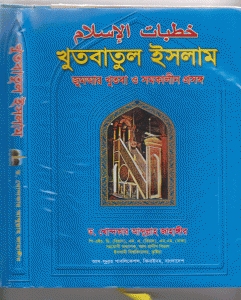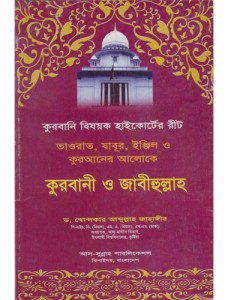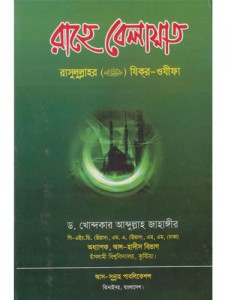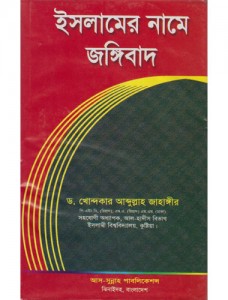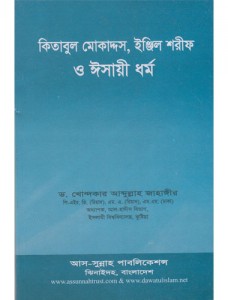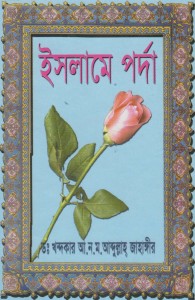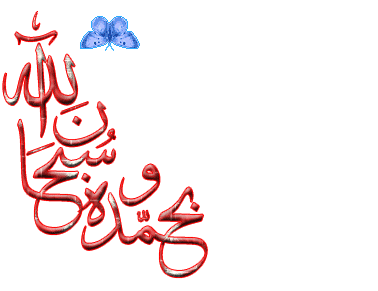 A Woman from Desert
A Woman from Desert
Written By:
Khandaker A N M Abdullah Jahangir
Edited by:
Abdul Haq C. Javier
1416 – 1995
In The Name of God (Allah), The Most Merciful, Most Compassionate
F o r e w o r d
All praise is due to Allah the Creator of Heavens and the Earth. May His peace and blessings be upon the final Prophet, Mohammad, his family and his companions.
Many books had written biographies of Women in Islam and were individually astonish- ing with their wonders of great devotion to Allah (God). To mention amongst the famous was the miraculous conception of the Virgin Mary who was a chaste and faithful woman.
She was chosen and ordained by Allah to be His Servant and Mother of Jesus (peace be upon him), a great prophet of Islam. As written in the Qur’an:
He said: “So (it will be):
Thy Lord saith; that is easy for me;
And we wish to appoint him
As a sign unto men
And a mercy from us
It is a matter so decreed.”
(Holy Qur’an 19:21)
It is so remarkable that each biography shows decencies of life upon the struggle to serve Allah, the Only True God.
Principles of honor, dignity, self- respect and recognition of woman’s rights on property, marriage and inheritance are clearly shown as an example to human race. Equality that uplifts the morale and confidence of a woman.
The story of Ummu Sulaim became a blot in the history, for it brings goodness in reality that compromise both the Islamic society and with the unbelievers’ culture.
The author is deeply indebted to Brother Abdul Haq Javier who took great pain in editing and re-writing the story for the better under-standing of woman in Islam and her role in the early Islamic society.
He is also thankful to Brother Abdulwahab Al-Qahtani for his great effort in publishing this book.
May Allah be pleased with this piece of work, with great endeavor and devotion for His cause.
Ignorance of the Yathrib tribe:
During the early Arab Years, there existed a distinguished town in the Arab Peninsula known as Yathrib. It was famous for its rich natural resources such as the abundance of palm trees. It was in this area where a group of Jewish people resided. The Arabs were greatly affected by the Jewish ways of life, for the fact, that they even later followed the Jewish cultures and their traditions.
As a fulfillment of Allah’s Covenant with Abraham to raise a great nation from the children of Ismail and His fulfillment of the prophecies of Moses, David, Jesus and other Prophets, Allah the Almighty sent His last Prophet and Messenger, Mohammed among the Arabs.
When Mohammad (peace be upon him) began preaching the Religion of Islam which was bestowed upon us by Allah, the immediate response of the people of Makkah was sour and full of opposition. They would rather continue their false belief in worshipping idols, superstitions and other inhumane social injustices. The leaders of Makkah humiliated Mohammad (peace be upon him) and even persecuted those that followed his teachings and belief. They made propaganda against Mohammad (peace be upon him) calling him names like an apostate (someone who abandons his religious faith for another), a sorcerer, a poet and a soothsayer. These acts generated havoc against Mohammad’s followers.
With all these hatred and horrors inflicted amongst the Muslim followers and himself, Mohammad (peace be upon him) reacted with courage and with forbearance. Their animosity and persecution could not prevent him from his Holy mission. He continued preaching the word of Islam among the people of Makkah and even meeting secretly the caravans of pilgrims on the way to Makkah.
Regaining their lost faith:
In the dark night of the month of Dhulhijja of the 11th year of his mission (620 Gregorian), the Prophet (peace be upon him) met a group of pilgrims originating from the town of Yathrib at their camp in Aqaba valley of Mina, in the outskirts of Makkah. He kindly approached them and began explaining and preaching the teachings of Islam.
They listened to the Holy Prophet, with all ears and full of curiosity and were caught surprised about what they had heard. Surprised in such a way because they have acquired such information from the Jewish people they lived with before. They knew that the Jews were waiting for a Prophet who would confirm the teachings of their sacred books and bring victory for the believers against those without Faith. They also heard the Jews saying that the time had come for the arrival of the Prophet.
The Yathrib pilgrims asked the Prophet (peace be upon him) so many questions regarding their own doubts which was purely and clearly answered by the Holy Prophet. This session inspired the Yathrib tribe of what they have found out and more so, made them surrender their will to Allah and believe that the Holy Prophet (peace be upon him) as the True Messenger of Allah.
Ummu Sulaims’ first marriage:
When the Yathrib pilgrims returned to their town, they spread the news of the True Faith and called the people to Islam. Through their countless effort and perseverance, many people accepted the call of Heaven.
Among the well-known families of Yathrib was the family of Malhan Bin Malik Bin Khalid of Najjar tribe. He has two sons namely Sulaim and Haram and two daughters who were Ummu Sulaim and Ummu Haram. Ummu Sulaim was married to a youth named Malik Bin An-Nadhr. The couple had a son whom they named ‘Anas’.
Ummu Sulaim was a woman of wisdom and reason. She was among the first of the people of Yathrib who freed themselves from the slavery of social traditions and ignorance and were among the first who accepted the “Truth” courageously.
Her husband felt outrageous upon learning of her decision in embracing Islam. He vocally opposed her and abused her and pressed her hardly to abandon her new Faith.
Ummu Sulaim was a woman of strong personality and determination. She ignored the pressure being applied to her by her husband. She felt that her soul experienced the real happiness with her new religion. She refused to leave the way of light. Instead, she chose the path of a Muslim life.
Sincere dedication to Islam:
Malik made his last move. He threatened to leave her permanently if she did not abandon her new faith. But this did not even change the will of Ummu Sulaim, she accepted her husbands challenge in favor of Islam in order to obtain the mercy Allah. Full of hate and frustration, Malik desperately left her wife and proceeded to Syria where he met his death.
Ummu Sulaim lived in Yathrib with her son Anas who was seven years of age at that period. She devoted her time in worshipping Allah and in spreading the teachings of Islam. For she was still young and famous for her natural beauty, wisdom and manner, a number of youth of Yathrib asked for her hand in marriage. She refused such an offer taking always in consideration of her son’s affection. She was very eager to raise her child “Anas” to be a true Muslim.
Earthly desire or Faith? :
Again, Ummu Sulaim concentrated in teaching Anas the Islamic Faith, Morals and Manners. Most of the people in Yathrib were illiterates because there were no regular school by that time. Despite of this handicap, Ummu Sulaim tried her best in teaching Anas the fundamentals of reading and writing.
Among those ardent admirers of Ummu Sulaim was a handsome and rich youth of the same Najjar tribe in the name of Abu Talha. He offered marriage to Ummu Sulaim but she turned him down for the sake of Anas. But after a few months, because of his genuine love and adoration with Ummu Sulaim, Abu Talha approached her again and tried once more.
But Ummu Sulaim was firm on her stand and said: “O Abu Talha, a man of your quality is hard to refuse and to tell you the truth is that I do like you. But I being a Muslim, can not marry an unbeliever. O Abu Talha, for once, please think about your religion. Aren’t your gods carved by the slaves of your family?”
“Yes, it is true,” Abu Talha replied.
“Is it a fact that you can burn them by putting them on fire?” she asked.
“Yes, we can burn them anytime we want to,” he answered.
“How can a man of your quality follow and worship such things!?” Are you not ashamed in worshipping such idols, stones or trees instead of the True Creator and Sustainer of the universe?”
“Let me think about it,” Abu Talha murmured, feeling puzzled by the last question asked by Ummu Sulaim.
Ummu Sulaim continued: “ O Abu Talha, I call you to accept the True Religion of Allah that He selected for humanity and revealed to Mohammad (peace and blessings be upon him)”. “It is to worship the Only and True God, by trusting in Him, by adhering the principles of morality and by renouncing both ignorance and cruelty.”
“This is the only way we can attain the mercy of Allah, His blessings and the satisfaction of our souls. If you can accept the Truth, then and only then, will I marry you”, Ummu Sulaim said.
Abu Talha departed and proceeded to his house, wondering and thinking about what Ummu Sulaim had just said. Her words struck his heart. He seriously asked himself: “What is it in this Faith that changed Ummu Sulaim to that extent that she keeps her Faith above all worldly pleasures?”
His deep thoughts led him to a conclusion. After a few days, he went back to Ummu Sulaim’s place and sincerely declared: “I have decided to accept Islam and that I bear witness that there is no god but Allah and Mohammad is His Servant and Messenger!”
Ummu Sulaim was extremely happy. She said: “I consider your conversion to Islam, the noblest bridal dowry for myself and that I agree to marry you without any dowry at all.”
They felt so happy with their married life. Their hearts were full of trust in Allah and love for each other. They supported each other inpropagating the teachings of Islam. They gave themselves the sincerest respect and advice with regards to Islam. And as time passes, they were considered as an honored Muslim family among their tribe.
First meeting with the Prophet:
It was pilgrimage season that year, the 13th year of Mohammad’s mission (622 Gregorian) that a group of people, comprising of 72 men and women belonging to the town of Yathrib, (including Abu Talha and Ummu Sulaim) came to Makkah to secretly meet the Holy Prophet (peace be upon him). They were very enthusiastic to find him living with them, listening to his preaching and bearing the comfort and peace of mind.
They also invited the Holy Prophet and his companions to travel to Yathrib and expressed their readiness in protecting them and moreover, even in sacrificing their own lives for their safety.
The Holy Prophet (peace and blessings be upon him) accepted their offer. He asked them to select 12 persons among the tribe of Yathrib who will be appointed as their Muslim leaders in their area. Abu Talha, the husband of Ummu Sulaim was among the selected leaders.
Three months later, after that conversation with the Holy Prophet, in September 622 Gregorian, the Messenger of Allah (peace be upon him) migrated to the town of Yathrib and was later known after his migration as “Madinat Ar-Rasuul” or the “Town of the Messenger of Allah”.
Abu Talha and Ummu Sulaim became among the closest companions of the Messenger of Allah (peace be upon him).
Offering her son, Anas:
Ummu Sulaim’s dedication to Islam and to His Messenger didn’t made her neglect the responsibility of a mother. She was always thinking about how her son, Anas, could be brought up to be a true and good Muslim. She was very anxious for her child’s proper education. So, she finally decided to endorse her son, Anas, to the noblest teacher of mankind. She presented her son to the Holy Prophet (peace be upon him) by saying: “O Messenger of Allah, this is my son, Anas. I thought him how to read and write. Please accept him as one of your humble servants.”
From then on, Anas, the son of Ummu Sulaim served the Holy Prophet (peace and blessings be upon him). The Prophet cared and loved him so much.
Once, Anas said: “I served the Messenger of Allah for ten long years and never did he scolded me even once. Serving him as his attendant during his travels, I never did hear him say: “Why did you do so?” for anything that I have done nor, “Why didn’t you do this?” for anything that I failed to accomplish.”
Ummu Sulaim did the best thing a mother could do for his beloved son, when she submitted him to the Holy Prophet (peace be upon him).
Staying with the Holy Prophet (peace and blessing be upon him), enabled Anas to attend every session of lectures being rendered by the Holy Prophet. This made him acquire more knowledge and wisdom, and strengthen his loyalty and belief to Allah.
Anas became one of the most famous companions of the Prophet who were celebrated throughout the Islamic world for possessing the knowledge of the Prophetic traditions, the Islamic jurisprudence and Wisdom.
Ummu Sulaim was also eager to have the blessings of the Holy Prophet (peace be upon him) for his son, Anas. One day, she found the Prophet alone and approached him and said: “O Messenger of Allah, please pray for your servant Anas.” The Prophet (peace be upon him) kindly replied to her request by saying: “O Allah, please provide Anas a bounteous wealth, plenty of offspring, a long life and forgive his sins.” This prayer was accepted by Allah for Anas got innumerable riches and more than a hundred issues and lived for more than a hundred years and died in 91 A. H..
Showing her leadership and bravery:
Ummu Sulaim didn’t serve for the Prophet’s personal needs alone, but also participated in the many battles of the Holy Prophet. She also served as a nurse for the injured and supplied water for the hundreds of soldiers in the battlefield.
In the third year of the Prophets’ Migration (Hegira), the famous battle of Uhud erupted. About three thousand (3000) pagan warriors came to Madina with the mission of slaughtering the Muslim population. But the Holy Prophet bravely faced them with only a thousand of his loyal Muslim warriors. It was a bloody battle between the believers and the pagans.
Even out numbered, the Prophet (peace be upon him) together with his warriors did not show fear, henceforth, they fought like machines, crashing every opponent crossed their path.
Moans of anguish and cries of pain can be heard every where. And the foul odor of the wind, possessed the smell of death. Abu Talha showed his gallantry with the use of his bow and arrow, fighting side by side with his compatriots while simultaneously protecting the Holy Prophet (peace be on him). Scores of pagan soldiers fell from their camels and horses and only to find their death on the ground. Many Muslim warriors got wounded. And that women Muslims, specially Ummu Sulaim, spearheaded the nursing of the wounded and distributing water amongst the Muslims warriors. Her son, Anas once said: “I saw Ummu Sulaim and Ayesha Bint Abu Bakr rushing towards the Muslim warriors. Back and forth they went, from the spring to the battlefield, Ummu Sulaim carried a camel skin bag full of water on her back, unmindful of the danger which could cause their lives.
The Prophets’ miracle:
Thus, this devoted woman and her husband lived along with the Holy Prophet (peace be upon him) . When not in battle, they join the Prophet with his regular prayers and attended his sessions.
One day, as Abu Talha came in to his house, he told Ummu Sulaim that: “I heard the Prophet (peace be upon him) calling in a very weak sound. I think he is hungry. Do we have any available food in the house?”
“Yes,” she replied. Then she placed some loafs of bread in a piece of cloth and and gave it to his son, Anas and sent him to the Prophet (peace be upon him). Upon reaching the mosque, Anas saw the Prophet sitting among his compa-nions who were all around him. The Prophet immediately noticed Anas and asked:
“Did Abu Talha send you?”
“Yes”, Anas replied.
“With food?”, the Prophet asked.
“Yes,” Anas Answered.
Then the Prophet told his companions:
“Let us all go and take our meal at Abu Talha’s house.”
All those who were present with the Prophet (peace be upon him) started to walk towards the house of Abu Talha. Anas was somewhat surprised and panicked to see that everybody was coming, so he run as fast as he could to inform Abu Talha about the turn of the situation. Abu Talha somehow felt embarrassed knowing that nothing is ready to feed all those people. He ran to his wife and said:
“O Ummu Sulaim, the Prophet (peace be upon him) and tens of his companions are on their way to take their meal here! What are we going to serve them?”
Ummu Sulaim remained calm and asked:
“Is the Prophet himself coming?”
“Yes”, Abu Talha answered.
Ummu Sulaim said: “Do not worry, then. Allah and His Messenger knows best. We’ll just have to wait for the Prophet’s instructions.”
Then a moment later, the Prophet and his companions arrived. The Prophet entered the house and immediately said: “Ummu Sulaim, bring whatever food you have.”
She brought the few loafs of bread in a vessel. Then the Prophet asked her to sap them and pour some soup in to the vessel. Then the Prophet (peace be upon him) prayed for the food and asked Allah’s blessing for it. Then he told Abu Talha: “Bring 10 of the disciples to eat.” Then, a group of ten men came and ate their meal.
Then another group of ten, came and ate. In eight such groups, all of the eighty companions ate and their appetite satisfied from that small quantity of food. What a great miracle it was! The faithful family was so amused and delighted with this event. Ummu Sulaim thanked Allah for His blessings and mercy.
A woman’s ordeal:
The joy of this blissful couple were multiplied when Ummu Sulaim bore a baby boy. They named him “Abu Umair”. The sight of this child was the comfort of their eyes. They both treasure him so much. Even the Holy Prophet (peace be upon him) loved and cherished the child.
Once, Abu Umair had a pet bird and breed it. But unfortunately, the bird subsequently died. Abu Umair felt very sad. The child took this seriously that he kept on crying.
When the Holy Prophet (peace be upon him) was informed of this, he came to Abu Talha’s house and consoled the child by having fun with him.
After a few months the child became sick. Both Abu Talha and Ummu Sulaim got very worried about his health. They tried their best for his immediate recovery and spent most of the time at his bed side.
Every time Abu Talha returned home from a journey, he would asked about the boy’s condition before doing anything else and sat at his bedside.
One day, Abu Talha went to the Prophet’s mosque to perform Eisha (night) prayer. During that time, the child expired.
Ummu Sulaim got sad and shocked for the sudden death of their child. But as a strong women she was, she did not lost her composure and kept herself under control.
She remembered, that a Muslim should face any difficulties with patient perseverance. So, silently she wept for her child and said: “To Allah we belong and to Him we will return.”
She realized that breaking this sad news to Abu Talha might terribly hurt him. She thought for a while, then organized herself and arranged the lifeless body of their precious child on his bed, just as if he was asleep. When Abu Talha returned from the mosque, he asked about his son. Ummu Sulaim casually responded by saying:
“He is now better than before.”
Abu Talha felt relieved and contented when he saw the child lying on the bed. Thinking that the child was on his way for recovery and he did not bother to go near the bed so as not to awake the child. Ummu Sulaim on the other hand, prepared a wonderful dinner for his husband.
Then she prepared herself by refreshing her body and used means of enhancing her beauty. They both went to bed. The thought of the child’s recovery brought mental satisfaction and joy to Abu Talha.
He spent a while exchanging pleasantries with his wife and in the process got attracted with Ummu Sulaims fragrance and engaged in love-making. Then they both went to sleep comfortably.
That same night, Abu Talha was awaken by Ummu Sulaim and said: “O Abu Talha, if somebody lend us something, does he have the right to ask us to return it to him again?”
“Absolutely, he has the right,” he replied.
“Do we have any right to prevent it or abstain from giving it back to him?” she asked.
“We do not have such right” he said, but followed it up with his own inquiry.
“Why are you asking such questions?”
“Allah the Almighty gave you Abu Umair as a loan. For a period of time, you have enjoyed his presence. Now, Allah has taken him back to Him. You should be patient and resign in Allah’s will in anticipating the reward in the hereafter.”
Abu Talha got extremely sad and sorry. Nevertheless, as a faithful Muslim trusting in Allah, he surrendered to the will of Allah. But deep within his heart, he was very mad. He exclaimed:
“However, why did you not tell me first!? Why did you tempted me gradually and led to have love and become impure!? Can a husband and wife have love beside their child’s dead body!?”
Ummu Sulaim tried to calm him down. She said:
“Whatever I have done was only for Allah’s sake, to attain his blessings and award by way of patience and submitting to His will.
The next morning, Abu Talha immediately went to the Mosque of the Holy Prophet (peace be upon him) to perform the Fajr (morning) prayer. After the prayer, he informed the Holy Prophet (peace be upon him) about the sudden death of their son and narrated what Ummu Sulaim has done.
Although the Prophet (peace and blessings be upon him) was sad for the death of the beloved child, he was greatly satisfied to know the strength of Ummu Sulaim’s faith, her perseverance and determination. He prayed for the couple and said: “May Allah make last night morning blessed for the both of you”.
Abu Talha was enlightened to get the blessings of the Prophet (peace be upon him). He went home and completed the funeral proceedings of their child, prayed and buried him. After a few weeks, Ummu Sulaim realized that she has conceived and it was very obvious that it happened that night when their son died. The couple were again cheerful for this blessed gift of Allah.
Her last days with the Prophet:
During the month of Ramadhan of 8 A. H. , the Holy Prophet (peace be upon him) proceeded to Makkah with a huge army. Despite being pregnant Ummu Sulaim went with them. The unbelievers of Makkah found out that the force of Prophet Mohammad’s warriors was too much for them. They surrendered to the Holy Prophet without any remarkable resistance.
When the Arab pagans heard that the Prophet (peace be upon him) and his army won over the pagans of Makkah, they organized a great gathering in Hunain, a valley in the mountainous country between Makkah and Taif, about 25 kilometers east of Makkah. They were planning to attack the Prophet.
From Makkah, the Prophet (peace be upon him), marched towards them and caught them with at Hunain. Ummu Sulaim was in the last month of her pregnancy, yet she took her part in every battle. The battle has started and every able Muslim warrior fought to their best. During the battle, Abu Talha saw his wife carrying a dagger. He was surprised and told the Prophet: “O Messenger of Allah, look at Ummu Sulaim, she is carrying a dagger!”
Ummu Sulaim heard him and said: “O Messenger of Allah, I took this dagger to defend myself. If a pagan will come close to me during my work of nursing and supplying water to our compatriots, I will not dare to slit open his belly with it!”
The Messenger of Allah just smiled at her as a response.
The Prophet (peace be upon him) defeated the unbelievers and returned to Madina. He and his army reached the area of Madina at night. They camped outside the town, as the Prophet (peace be upon him) disliked to enter Madina at night on his return from a journey.
In the morning, the army proceeded towards the town. At this time Ummu Sulaim was caught by labor pain forcing Abu Talah to be left behind to stay with her. He was so sorry to be deprived from the Prophet’s accompany to the end of the journey. He prayed by saying:
“O my Lord, you know that my desire is to be with the Prophet (peace be upon him) where ever he goes, to leave Madina and enter Madina with him. O Allah, help me and fulfill my desire.”
His prayers was accepted, when suddenly Ummu Sulaim said: “I am no longer in pain, you may go now with the Prophet (peace be upon him).” Abu Talha was glad. At once, he moved on and received the honor of accompanying the Prophet to the end of the journey.
The following night, Ummu Sulaim suffered again, with the return of her labor pains. At late night, she gave birth to a male baby. The whole family rejoiced, for this boy was part of every battle they have encountered and that he came back with them! Anas was there comforting her mother. Ummu Sulaim said:
“O Anas, do not let anyone feed the baby and in the morning take him to the Holy Prophet so that he would be the first to feed your brother.”
So that early morning, Anas took his newborn brother and presented him to the Prophet (peace be upon him). He also took a few dates with him. The Prophet took the child and uttered some prayer for him. Then he asked Anas: “ Do you have something to eat?”
Anas readily gave him some dates. The Holy Prophet (peace be upon him) put a date in his mouth and chewed it. Then took it in his hand and placed it in the baby’s mouth. Then he named the child “Abdullah”. The blessings of the Prophet materialized with the child. In the course of time he and his descendants became prominent Muslim scholars of the Holy Qur’an and obtained relevant knowledge.
Ummu Sulaim’s love, respect and reveren-ce for the Holy Prophet (peace be upon him) was incomparable and boundless. Anas said:
“One day the Prophet went to our house and slept there on a leather mat. It was midday and the Prophet was pouring sweat from the hot weather.
My mother took an empty bottle and began extracting his sweat from the mat. This awoke the Prophet (peace be upon him) and he asked:
“O Ummu Sulaim, what are you doing?”
She replied: “I am taking your sweat. Your sweat has more fragrance than the scent of a perfume. I will put it in my scent and use it on my children. O Messenger of Allah, I expect its blessings for my children.”
Out of her dedication, devotion and sincerity, Ummu Sulaim attained a high position in the heart of the holy Prophet (peace be upon him). He used to visit her and take drinks and food at her home.
During his final pilgrimage to Makkah, the Prophet shaved his head. He ordered the barber to shave the right part of his head first and he distributed the hair among his companions. Then he asked the barber to shave the remaining left side of his head and gave this part to Ummu Sulaim.
The Holy Prophet (peace be upon him) prayed for her. She said: “The Messenger of Allah invoked blessings on me and everything that belong to me became blessed to the extent that I do not desire for any increase or excess.”
The Prophet (peace be upon him) gave her the glad tidings of Paradise. He said, In the night of my Journey to the Heavens (Miraj) I entered the Paradise and heard the sound of footsteps.
I asked the angels: “Who is there?”
They told me: “It is the mother of Anas, daughter of Milhan”.
Ummu Sulaim, the pious:
Ummu Sulaim remained in Madina with her husband after the death of the Holy Prophet (peace be upon him). In addition to serving her husband and executing her responsibility as a pious and devoted wife, she preached the teachings of the Holy Prophet. A number of Muslim scholars learned the traditions of the Prophet from her. In about 30 A. D. this pious and blessed woman died in Madina. May Allah be pleased with her.
BIBLIOGRAPHY
A. The Holy Quran:
The Holy Quran, English translation of the meanings and commentary, by Abdullah yusuf Ali, edited and published by King Fahd Holy Quran Printing Complex, Madina Al-Munawara, Saudi Arabia.
B. Hadith (Collections Of Prophetic Traditions):
– Bukhari, Muhammad Ibn Ismail, Saheeh, Halabi Press, Cairo, 1953.
– Ibn Hajar Al- Asqqlani, Fathul Bari (Commentary on Saheeh of Bukhari) Dar-ul Fikr, Beirut.
– Muslim Ibn Hajjaj, Saheeh, edited by Muhammad Fuad Abdul Baqi, Dar Ehya Al-Kutub Al- Arabia, Cairo.
– Nawawi, Yahya Ibn Sharaf, Sharh Saheeh Muslim (Commentary on Saheeh of Muslim), Dar Ul Fikr, Beirut.
C. Biographical and Historical Works:
– Dhahabi- Al, Shams Al-Deen, Siyar A’laam Al-Nubala (Biographies of the Noble People), edited by Shuaib Al- Arnaut and others, Al-Risala Establishment, Beirut.
– Ibn Abdul Bar, Al-Isaaba Fee Ma’rifat As- Sahaba (The Comprehensive Works on the Knowledge of the Prophet’s Companions), Hyderabad, India, 1318 A.H.
– Ibn Al- Atheer, Al- Kamil Fi-At- Taareekh (the Comprehensive Work on History), Halabi Press, Cairo, 1303 A.H.
– Ibn Hajar Al- Asqalani, Al- Isabah Fee Tamyeez As- Sahaba (The True Record That Distinguishes the Prophet’s Companions), Sa’adah Press, Cairo.
– Ibn Hisham, Muhammad Ibn Abdul Malik, Seerat An Nabi (The Biography of the Prophet, peace be upon him), Dar Al-Rayyan For Heritage, Cairo, 1987.
– Ibn Sa’d, Muhammad, Al- Tabaqat Al-Kubra (The Biggest works on Categorizing of People), Beirut, 1960.
– Ahmed, Mahdi Rizqullah, Al- Seerat Al- Nabawiah Fee Dhaowil Masadir Al-Asliyah (The Biography of the Prophet- peace be upon him- in the Light of The Original Authentic Sources), King Faisal Faundation for Islamic Researches, Riyadh, 1992.
– Tabari, Muhammad Ibn Jarir, Taareekh Al- Umami Wal Muluk (History of the Nations and Rulers), edited by Muhammad Abul Fadhl Ibrahim, Dar Suaidan, Beirut.
Table of Contents
Foreword 30
Ignorance of the Yathrib tribe…….. 1
Regaining of their Lost Faith……… 2
Ummu Sulaims’ first marriage……. 4
Sincere dedication to Islam……….. 5
Earthly desire of Faith ? …………… 6
First meeting with Prophet………. 9
Offering her own son, Anas………. 10
Showing her leadership and bravery.. 12
The Prophets’ Miracle……………… 14
A woman’s ordeal…………………… 16
Her last days with the Prophet…. 21
Ummu Sulaim, the Pious…………. 26
Bibliography 27
Click here to download PDF
ভাল লাগলে অবশ্যই শেয়ার করুন



